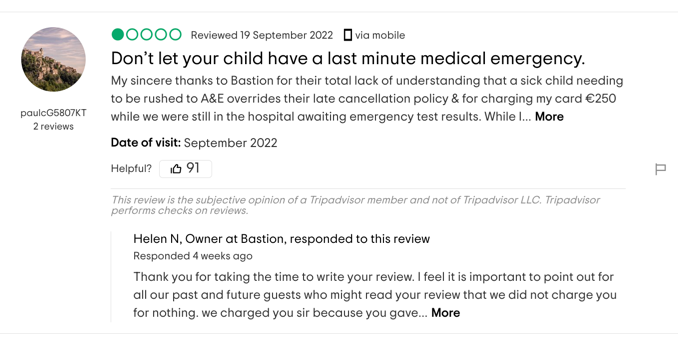The Bastion Fairness Question
Recently, Killarney-based Michelin star restaurant Bastion was in the news for charging a “no show" customer a €250 fee, the customer had contacted them to cancel thirty minutes before their scheduled arrival time.
Soon after, the unhappy customer posted a one-star review on TripAdvisor ..
... 2 weeks later, the restaurant replied,
... a month after the review, a Cork online newspaper featured the review; the story got picked up by other media and was highlighted in many other countries and on TV in France
This led to the restaurant showing up in the media and receiving a surge of 1-star reviews, particularly from unhappy french observers who had never been to the restaurant.
On Fairness
Was the restaurant's response to the late cancellation fair?
There are certainly different opinions...
Many understood the challenge facing the restaurant, likening it to booking a theatre or buying a ticket.
Also, the restaurant did point out they regularly receive attempted last-minute cancellations, even from some claiming to be in A&E who appeared to experience rapid cure and make it on learning of the cancellation fee!
I can certainly relate to the issue. In my self-defence training business, we have limited availability, and when people cancel at short notice, it has several effects. The obvious financial impact, but also it can impact the dynamics and perception of the business by those who do attend.
Lessons
Whatever your opinion, there are some lessons to be learned.
Everything happens in the Public Domain.
Every Customer Interaction is public and may be judged by thousands, perhaps weeks or months after the event. What in the past might have been an issue between the restaurant and the customer blew up and was highlighted to a huge audience across several countries, and the story now shows up on the first page of Google when the restaurant is searched for.
Fairness doesn't always feel good.
Even though the customer provided their card details for the “no show charge”, they were very unhappy!
In their review, they cited a lack of empathy from the restaurant.
The problem with Fairness is it doesn't necessarily feel good. The customer wasn't happy, and I would guess neither was the restaurant owner.
They also had to experience the stress and anxiety of their actions being judged in the public domain.
An Alternative: from Fairness to Generosity
Based on my own experiences, I have developed a “Fairness to Generosity Strategy”
Terms and conditions and rules are necessary in business. They provide a framework for everyone to understand the process, their options and associated costs.
They act as a deterrent to poor behaviour and a security blanket for the business and customer. But when interpreted without empathy or compassion, they can cause damage.
Be fair when setting rules, be extremely clear on 'why' and, if possible, build the rule into the process instead of implementing it as a punishment.
For example, many premium restaurants charge for their tasting menu on booking, similar to how we expect to pay when purchasing a theatre or concert ticket. Now there is no further action required by the restaurant in the event of a no-show...
..and the customer has the option of transferring the booking if necessary or, of course, engaging with the restaurant to find a mutually agreeable solution.
This type of strategy can help mitigate disappointment, but it still hurts the customer if they can’t make it for a reason beyond their control.

Moving toward Generosity
This is when a focus on Generosity comes in…
My suggestion is that when it comes to implementing the rule, you should move towards Generosity. When people are generous, it surprises us, generates an emotional connection, and we feel seen and appreciated.
Bastion was in a tough place, they are no doubt dealing with tight cash flow and the pain of perishable revenue (my pre-pay suggestion above would alleviate this).
A generosity-focused strategy might have been to charge the fee to manage the cash flow hit for that night,
… but issue the customer with a new voucher for the amount to be used in the future, perhaps on an off-peak night..
… yes, there is still a cost to the restaurant, but the customer now has a different story to tell.
What Story do you want your Customers to Tell?
When you face a challenge with your customer, consider how you want them to feel, and what story you want them to tell
.. as if they were presenting it to a crowded auditorium .. because it can very easily be the case.
Fairness protects the downside, Generosity is an opportunity to connect emotionally and create stories about who you are.
Over to you…
Where can you surprise a client with Generosity even if you don't have to
....what story will they tell about your business ?
